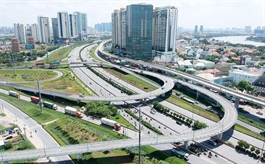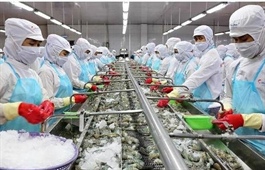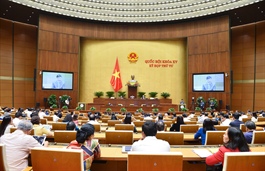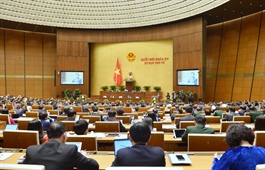NA agrees to raise basic wage next July
NA agrees to raise basic wage next July
The Vietnamese Parliament expects a budget deficit of VND455.5 trillion (US$18.35 billion), or 4.42% of GDP, for next year.
The National Assembly (NA) on November 11 ratified a resolution on the state budget estimate for 2023 with the endorsement of 91% of deputies at present.
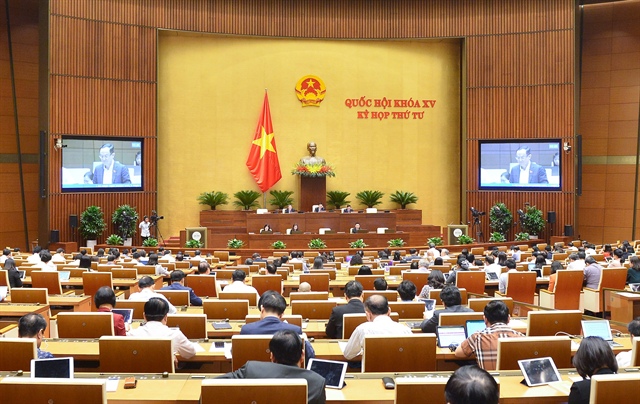
Overview of the session. Source: quochoi.vn |
Under the resolution, the NA agreed to raise the basic wage for public servants from VND1.49 million ($60) to VND1.8 million ($73.3) from July 1, 2023, representing an increase of 20.8% from the current base.
In addition, pension and social support for those having retired before 1995 will be increased by 12.5%.
It is estimated the Government would allocate VND12.5 trillion ($509 million) for wage reform.
Previously, many deputies called for the base salary adjustment to take effect as of January 1, 2023, or six months earlier than planned, to help public employees better cope with rising market prices.
Chairman of the NA’s Legal Committee Hoang Thanh Tung explained an increase in basic wage since early 2023 would coincide with the New year’s festive periods.
“Rising wages and high consumer demand in these periods would create huge pressure on the Government’s price management efforts, eventually leading to high inflation and causing negative impacts on people’s lives,” Tung said.
Under current regulations, the basic wage in Vietnam is the reference for calculating the total wage for civil servants by multiplying it with its corresponding coefficient.
The latest minimum wage hike took place on July 1, 2019, with an increase from VND1.39 million to VND1.49 million. Those starting their career in the public sector will be entitled to salary level 1 with a coefficient of 2.34, equivalent to a monthly salary of VND3.48 million ($140).
The resolution also sets the state budget revenue target for next year at over VND1,620 trillion ($65.3 billion) and expenditure of over VND2,070 trillion ($83.4 billion).
This would result in a budget deficit o VND455.5 trillion ($18.35 billion) or 4.42% of the GDP.
Meanwhile, the resolution expects the Government to borrow over VND648.2 trillion ($26.1 billion).
Reviewing the budget figures for 2023, Tung from the Legal Committee called for the Government to continue to finalize the legal framework on tax management, especially in new business activities under the digital economy, or cross-border transactions.
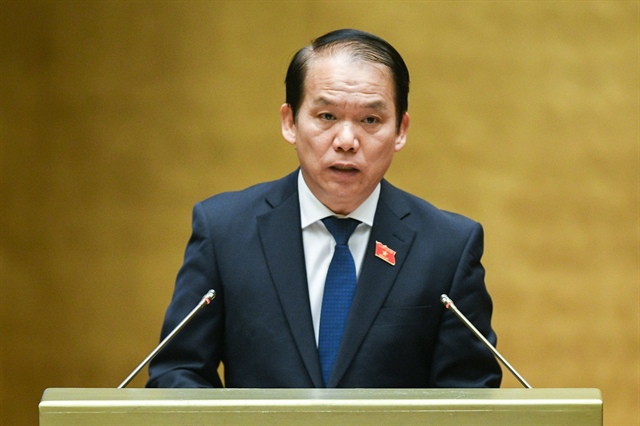
Chairman of the NA’s Legal Committee Hoang Thanh Tung. |
In case the actual budget revenue exceeds the year’s estimate, the Government is expected to report to the NA to allocate more resources for wage reform and reduce the budget deficit.
Tung pointed out the need for the government from 2023 to establish a supervisory mechanism to control tax payments of foreign service providers, seen as a step to further complete the fiscal management of foreign entities.
Meanwhile, the Government is requested to intensify disciplinary measures in budget management, especially in the utilization of state resources, as well as to continue to cut unnecessary expenditures and trim regular expenditures.
Hanoi expects budget revenue to surpass the year’s target
For the first ten months of 2022, Hanoi’s budget revenue was estimated at VND294.8 trillion ($11.9 billion), equivalent to 94.8% of the year’s estimate and up 12% year on year.
Upon breaking down, domestic revenue made up a lion’s share of VND271.9 trillion ($11 billion), up 11.7%, followed by revenue from import-export activities and crude oil exports.
For this year, the city targets its budget revenue to surpass the year's estimate by 5%, further contributing to socio-economic development.
Secretary of the Hanoi Party Committee Dinh Tien Dung in a recent conference stressed the significance for Hanoi to further enhance efficiency in utilizing state resources, at the same time keeping in place supporting measures for businesses and people, including tax waiving, delay, and reduction.
In long term, Dung expected more efforts from the authorities in simplifying administrative procedures, and promoting business activities and production to ensure sustainable sources of income for the city.









